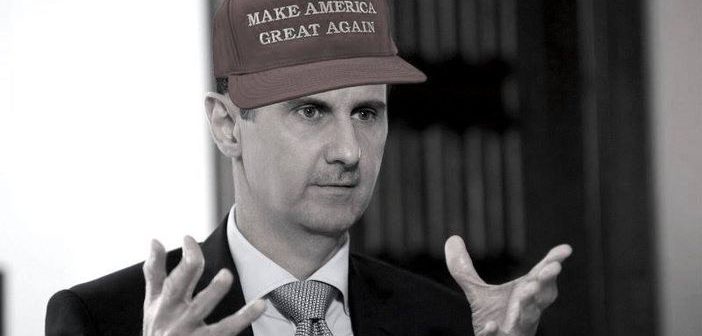Although his foreign policies are yet to be seen, the election of Donald Trump bodes well for Damascus. The defeat of Hillary Clinton, who is the main orchestrator of the Libyan quagmire and staunch supporter of the rebellion, makes the future a little less bleak for Bashar al-Assad.
Donald Trump’s remarks in comparison to his appointees are widely inconsistent. He stated “we could find common ground with Russia in the fight against ISIS”, while his vice-president elect, Mike Pence said that “the provocations by Russia need to be met with American strength”. Moreover, the chosen head of the National Security transition team, Mike Rogers co-sponsored an act allowing the arming of “moderate rebels” in 2013.
Mr Trump’s team could bring inconsistency, if not chaos on the ground. However, the Obama administration’s policy hasn’t been any different from the latter. The US military still supports various rebel factions with American made TOW anti-tank missiles. French, English, German and American Special Forces are on the ground with Kurdish YPG and the Syrian Democratic Forces (SDF, multi-ethnic coalition in the Northern Syria). Turkey, the key NATO ally in the region, has teamed up with various rebel factions and moved into northern Syria attacking both Kurdish and IS forces, while they’ve suffered causalities from air attacks by the Syrian army.
It is improbable that Trump’s administration would bring more chaos to the civil war than Obama’s. There are only two major forces left which haven’t gotten direct US support: The Islamic State and the regime. Even Bashar al-Assad’s ally in Iraq, the Shiite Paramilitary Units (PMU) have stated that after Mosul is taken, they’ll move into Syria. They’ve been invited by the Syrian President to fight against “terrorism” according to Hadi al-Amiri the leader of the Badr Forces and member of the PMU. We could see American weapons and Humvee’s used in Syria against US supported rebel forces and Kurds after the fall of Mosul. It is difficult to see how Trump could further complicate this already complex situation.
Win-win situation for Bashar
By looking at the appointees of the president-elect, the continuation of the current US policy is likely. However, Trump’s statements on Syria would see the alignment of the US foreign policy with Russia and thus Damascus, in the “fight against extremists”. This would be a major triumph for Bashar al-Assad, whose forces are advancing on the battlefield.
At the centre of it, in Aleppo, government-backed forces are scoring important victories. First a major offensive by Jaish al-Fateh (JaF, islamist coalition including al-Nusra Front) aiming at breaking the siege was thwarted late October. Unlike the previously successful offensive in August where the rebels managed to open a small corridor to reach their compatriots in the city, the goal this time was to break through most of the government-held western lines. This meant an attack on a much longer front line, and hoping for a domino-effect accumulating in the liberation of the whole north-western side of Aleppo. The offensive was a complete failure, as regime forces were well-prepared and front-lines barely budged.
With the rebels and citizens of East-Aleppo stuck in the siege, Damascus issued a three-weak cease-fire, and safe passage for militants and civilians to leave, but not many did. On the one hand this move was to appease the West, whose media was reporting daily about attacks on hospitals. On the other hand, it gave Damascus time to prepare an attack on the remaining rebel-held territory of Aleppo. Advancing in urban territory has been a big weakness of the Syrian army, but it seems that after five years of war, government-troops have made use of past experience. By the end of November, in a matter of days, loyalists captured a third of the pocket, and militants have left to the remaining southern part still under their control.
Rebels in Aleppo are abandoned
Staffan de Mistura, the UN special envoy to Syria has tried to save the city from further bloodshed. A UN-sponsored plan in November for militants to leave the city, and the creation of a demilitarized and self-ruling East-Aleppo was approved by the rebels but rejected by Damascus. A similar deal in 2015 was accepted by Assad, but the rebels didn’t even consider it then. A lot can change in Syria in a year.
The rebels in Aleppo have been demoralised by recent defeats in the city, and abandoned by their allies outside. Some militants have joined the Euphrates Shield, a rebel unit who is financed and protected by Turkey, cherry-picking on IS and Kurdish forces far from the siege. The rebellion has come to the point where the pay of $200 a month and hiding behind foreign tanks fighting for Turkish geo-political goals is more lucrative than trying to save their compatriots suffering elsewhere. Thwarting the fall of Aleppo would take a miracle.
Aleppo isn’t the only rebel-held territory which has witnessed the beginning of an endgame. The remnants of the uprising near the capital are suffering under pressure as well. In the east, the regime has captured a third of the Ghouta oasis in four months, the largest insurgent area in Damascus. The southern suburb of Darayya, once the shining star of the rebellion, has fallen to government forces, and lies in ruins. Groups there have either surrendered themselves or agreed to be transported to rebel territory in Idlib province by government buses. Further south, the militants of Khan al-Shieh, took up the offer as well.
Every “reconciliation” agreement means the evacuation of militants to the north. Strategically important points near the capital are lost, but instead the northern rebellion is reinforced. Bashar al-Assad is feeling safer, and the likelihood for a negotiated settlement of the conflict diminishes. His throne is more secure today than ever since the summer of 2012.
The fall of Aleppo isn’t the end
It’s difficult to see how the fall of Aleppo and the rebel-held territory around Damascus, would bring the war much closer to its ending. Rural areas in the south, the Rastan pocket north of Homs, Idlib province, and some of Aleppo province lie in the hands of anti-government forces. Turkey has put its troops on the ground within the Syrian side of the border to help rebel groups, while around them Kurdish and SDF forces are in power. The whole of East-Syria is controlled by the Islamic State, and only a third of the country is governed by the regime.
The weakest actor on the ground today are the various rebel groups, who will not unify. The fall of Aleppo and the areas around the capital will not bring more Gulf support for them, but they’re still strong enough to keep Idlib province in the north-west. Pro-government militias are still far away from threatening the bases of Salafi groups such as Ahrar al-Sham and Jabhat Fateh al-Sham (al-Nusra).
Trump might be setting the base for a negotiated settlement thanks to his phone conversation with Putin and Erdogan, along with the rapprochement of the last two. Turkish-backed rebels will negotiate if Ankara so wants. Kurds have been willing to discuss autonomy in Iraq, and would probably accept the same in Syria. ISIS’ days are numbered, as a functioning state.
The actor, who has proven to be incapable of change, reform and discussion is the Syrian government. Bashar al-Assad has repeatedly stated that his troops will retake all of Syria. He might grant some limited self-ruling capabilities to the Kurds in exchange for their cooperation, but there will be no power-sharing with Sunni rebels.
The governments “reconciliation” deals send militants to Idlib, and not to the more secular southern region. This weakens the south, which houses the only remaining rebel groupings, whom the West can work with and directly support; not that Trump would want to.
Bashar might have to accept Erdogan’s Ottoman style ambitions in Idlib province for the time being. It’s not vital territory, and has historically been opposed to Assad’s rule. If Erdogan sends in more Turkish soldiers to the north, Assad will have to accept these “new borders” without making peace. It is improbable that the rest of the rebellion would get a boost from Saudi-Arabia and Qatar with the loss of Aleppo, but the status-quo would remain.
If there’s one thing Bashar is good at, then that’s keeping his throne. He has outlived David Cameron in power and soon Barack Obama, while Francois Hollande is also on his way out. He has defied his enemies in the West. Now tides are turning with the arrival of Trump, someone he described as a potential “natural ally”.
Trump will have to align himself to the regime, as Bashar will not change for anyone. The unwillingness of the regime to negotiate, neither when winning nor when loosing, will result in more deaths, as the war is far from over on the battlefield.



